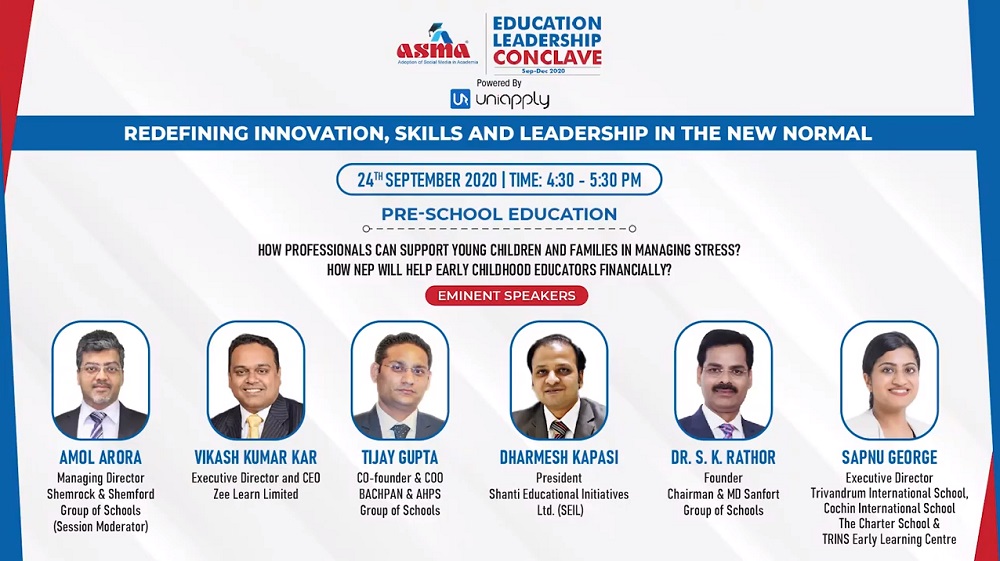ASMA Education Leadership Conclave – Preschool Session on ‘How Professionals Can Support Young Children and Families in Managing Stress?’
The esteemed panel also discussed the NEP and how it will help early childhood educators financially.
ASMA Education Leadership Conclave – Inaugural Event’s Preschool online session was held as part on 24the September 2020.
The panel was moderated by Amol Arora, Managing Director, Shemrock & Shemford Group of Schools and comprised of esteemed leader from the preschool education sector including, Dr S.K Rathor, Founder, Chairman & MD, Sanfort Group of Schools, Tijay Gupta, Co-Founder & COO, Bachpan & AHPS Group of Schools, Sapnu George, Executive Director, Trivandrum International School, Cochin International School, The Charter School, TRINS Early Learning Centre, Dharmesh Kapasi, President, Shanti Educational Initiatives Ltd, and Vikash Kumar Kar, Executive Director and CEO, Zee Learn Limited.
The panel discussed ‘How Professionals Can Support Young Children and Families in Managing Stress’ and also ‘How NEP will help Early Childhood Educators Financially?’.
Moderator by Amol Arora, Managing Director, Shemrock & Shemford Group of Schools opened the discussion by pointing out that the online mode of learning has been very effective with preschool children. He asked the speakers firstly how can this new mode of learning be made more efficient to ensure children are learning and also how to can schools maintain financial viability and survive the current situation.
Dr S.K Rathor, Founder, Chairman & MD, Sanfort Group of Schools remarked, “It was a big challenge to introduce the virtual classroom to such young children, especially since this is the age group where children cannot even sit for a long time in one place. So initially it was difficult for the children, the parents and the teachers, but eventually, we all learnt – including parents and teachers – how to make these sessions engaging. Initially, parents also thought maybe schools will reopen in July or August, now they realise schools will not reopen for the whole academic session. And I think at least for pre-schoolers, it will extend a little longer than this session. So now parents are beginning to understand the value of online learning for pre-schoolers.”
He added, “Now I have seen a good rise in the number of in virtual classrooms, compared to the number we had in April, May or July. This month we have at least 15-20 per cent more student in online classes.”
Rathor also elucidated on the fact that schools such as his that have branches in the metro cities and smaller towns have been performing better financially in the metro areas, especially since parents in smaller towns and villages are more reluctant to send their children to preschools.
Dharmesh Kapasi, President, Shanti Educational Initiatives Ltd remarked that as the COVID situation unfolded, one of the biggest challenges was convincing teachers and parents that online classes would be beneficial to preschool-aged children.
He said, “First we had to understand how to plan the whole curriculum to this particular age group with regards to what needs to be prioritised rather than having the same methodology and the curriculum which we normally have while conducting physical classrooms. We have designed our curriculum in such a way that it is adaptable in the online platform”.
Kapasi added, “We had also initiated a lot of sessions with our parents. We connected with our parents are started discussing the situation and making them understand that this is something that will last a little longer and that we will all have to come together to face the challenge and not lose out on the precious time of a child’s education”.
Commenting on the different scenario between the preschools and K12 schools as well as schools in the urban and rural settings, Tijay Gupta, Co-Founder & COO, Bachpan & AHPS Group of Schools said, “For the higher and upper classes we didn’t face many challenges with regards to fees, because practically parents see the value of online classes, while in preschools, parents do not see the practical approach that classes are going to happen. The problem is three layers; the children, the parents and the teachers. The teachers are easier to handle, but the parents are more difficult to handle because unless the parents see the value in online classes, they would allow their child to fit in front of a screen for 40-45 minutes”
He added that schools that are operating from their own properties would find it easier to manage their finances as opposed to those who are renting since not many landlords are ready to understand and compromise in the situation.”
Speaking on the NEP and what’s in it for international schools, Sapnu George, Executive Director, Trivandrum International School, Cochin International School, The Charter School, TRINS Early Learning Centre said, “I think the NEP has come at a good time because it endorses the education philosophy the international boards already follow. It will be good if it comes into practice since it will put all the school boards at par with a global arena.”



